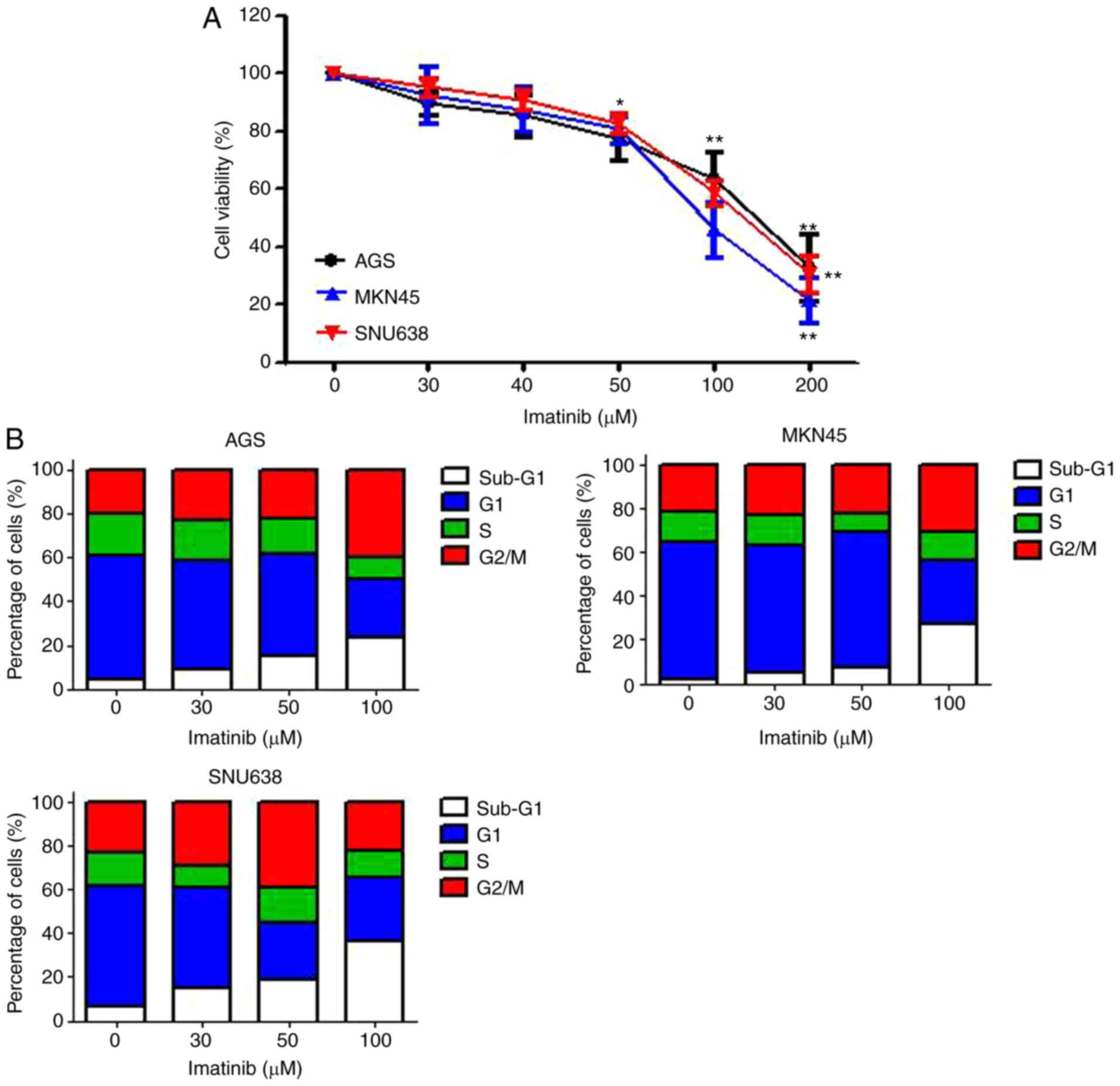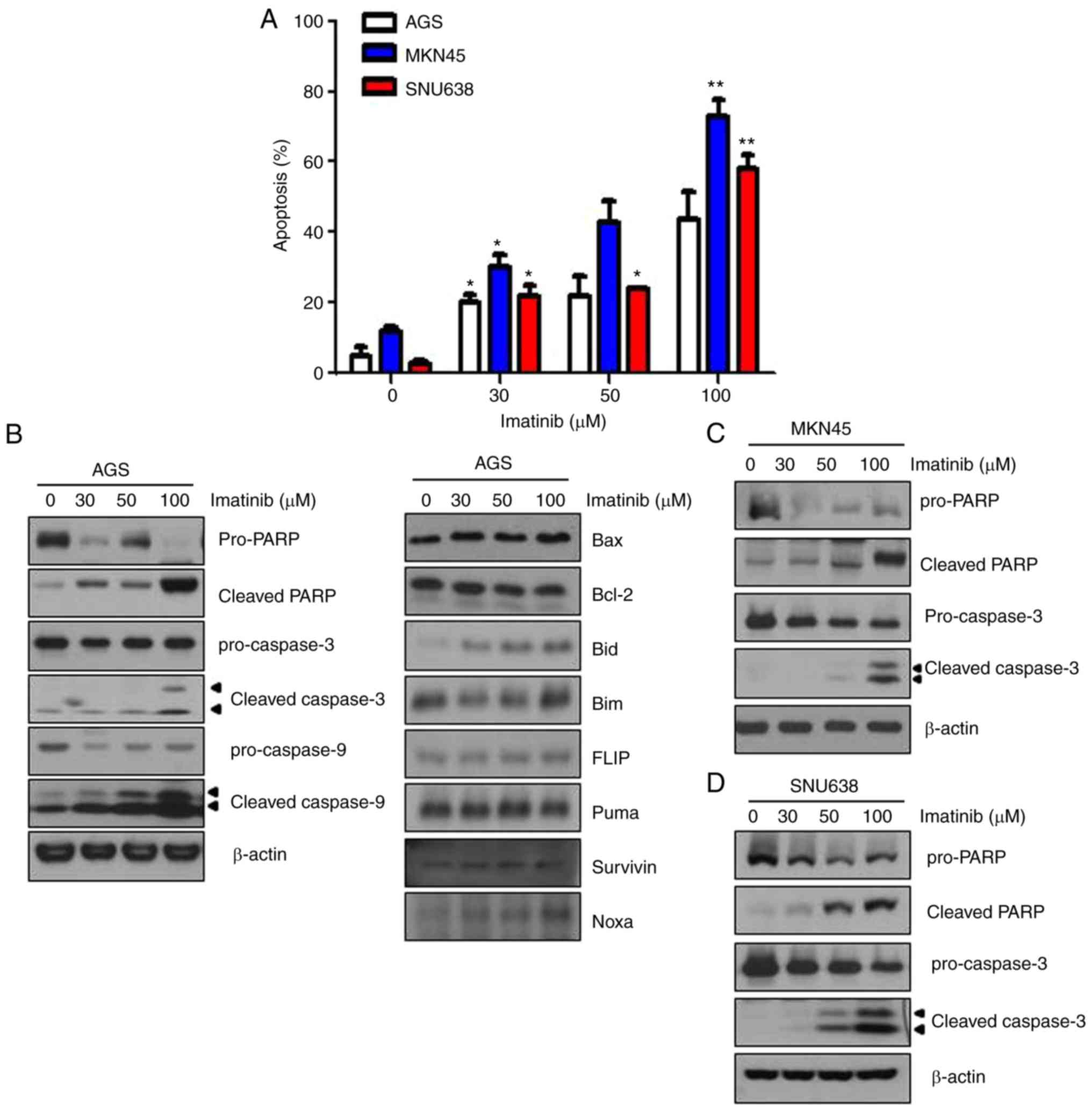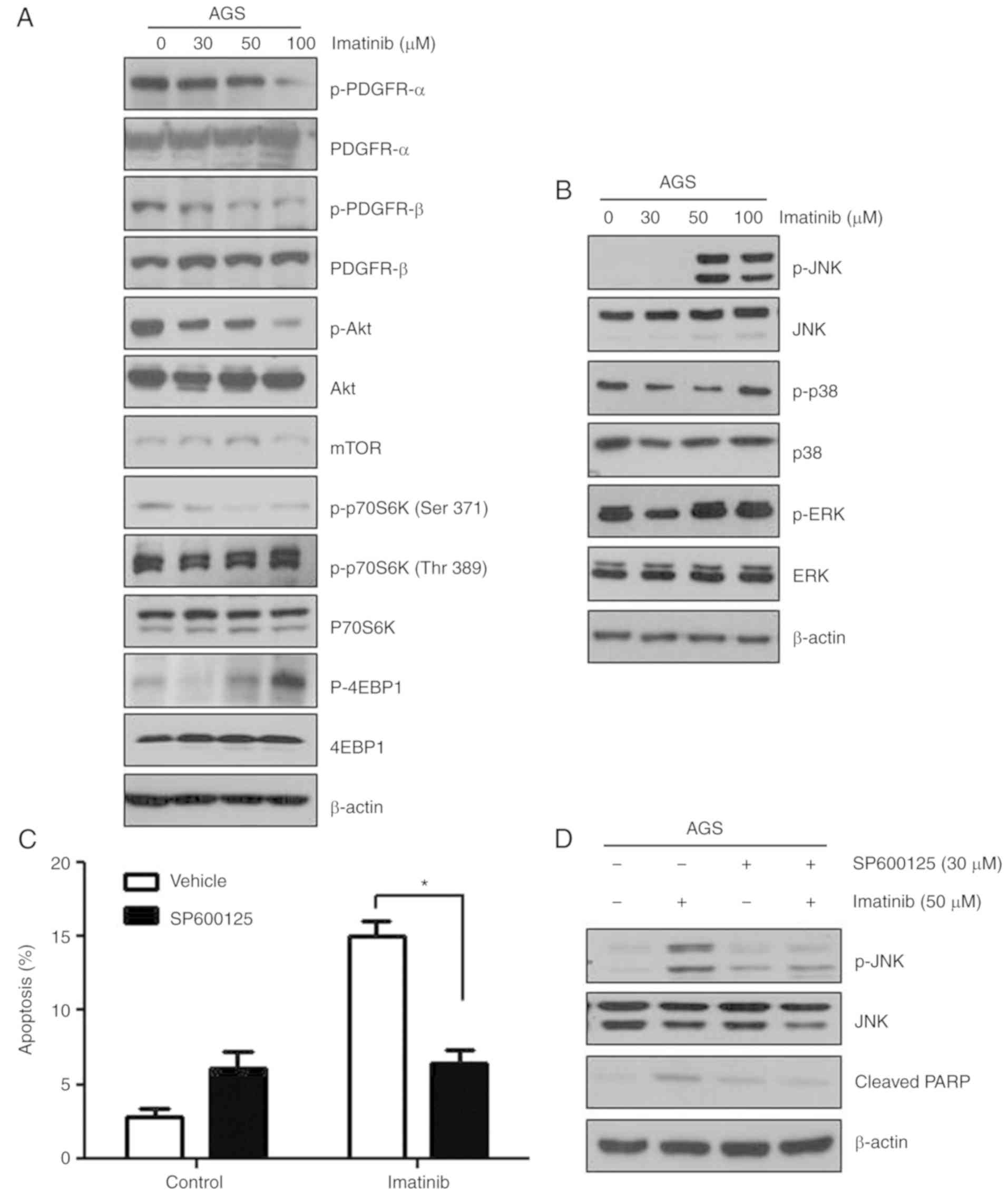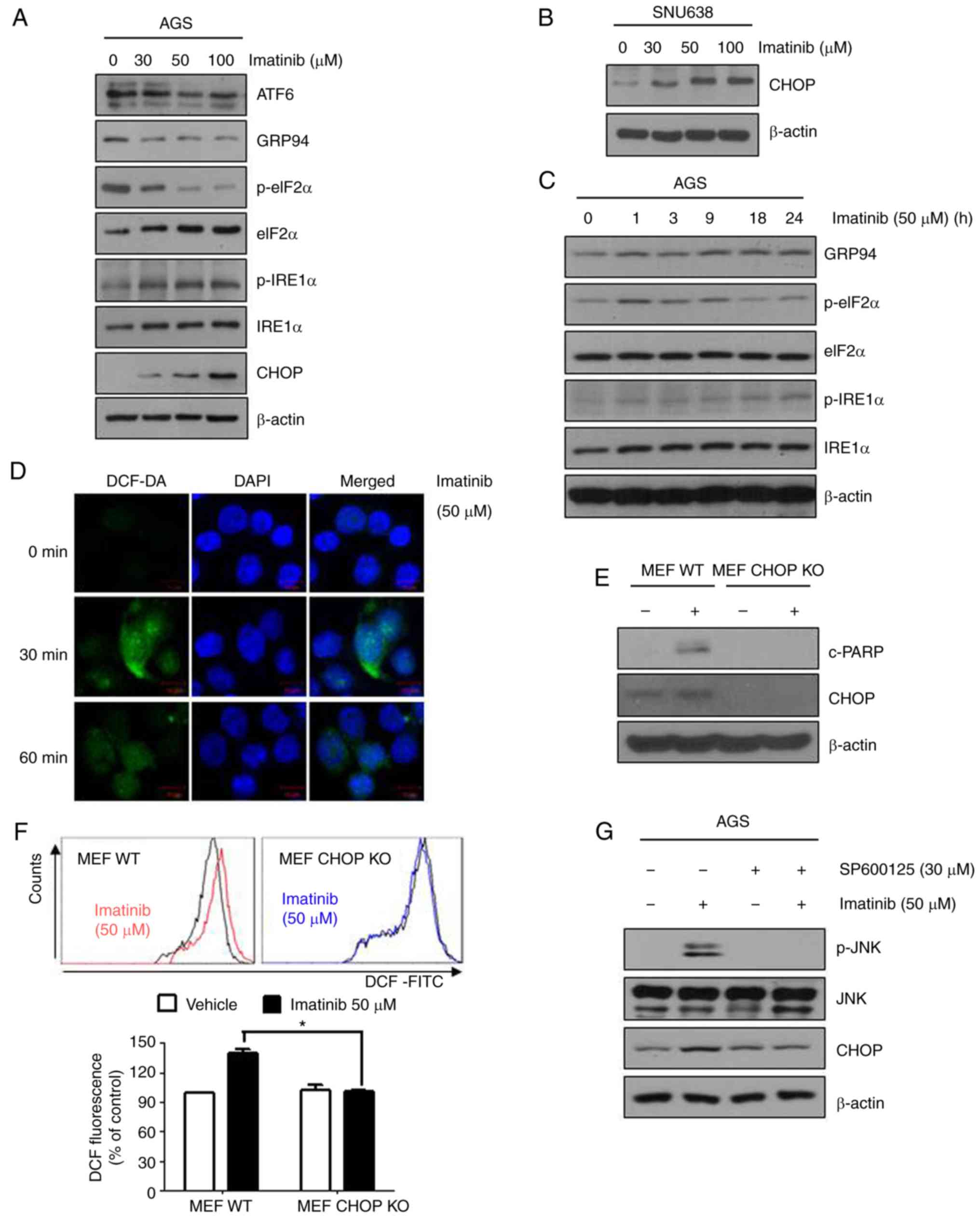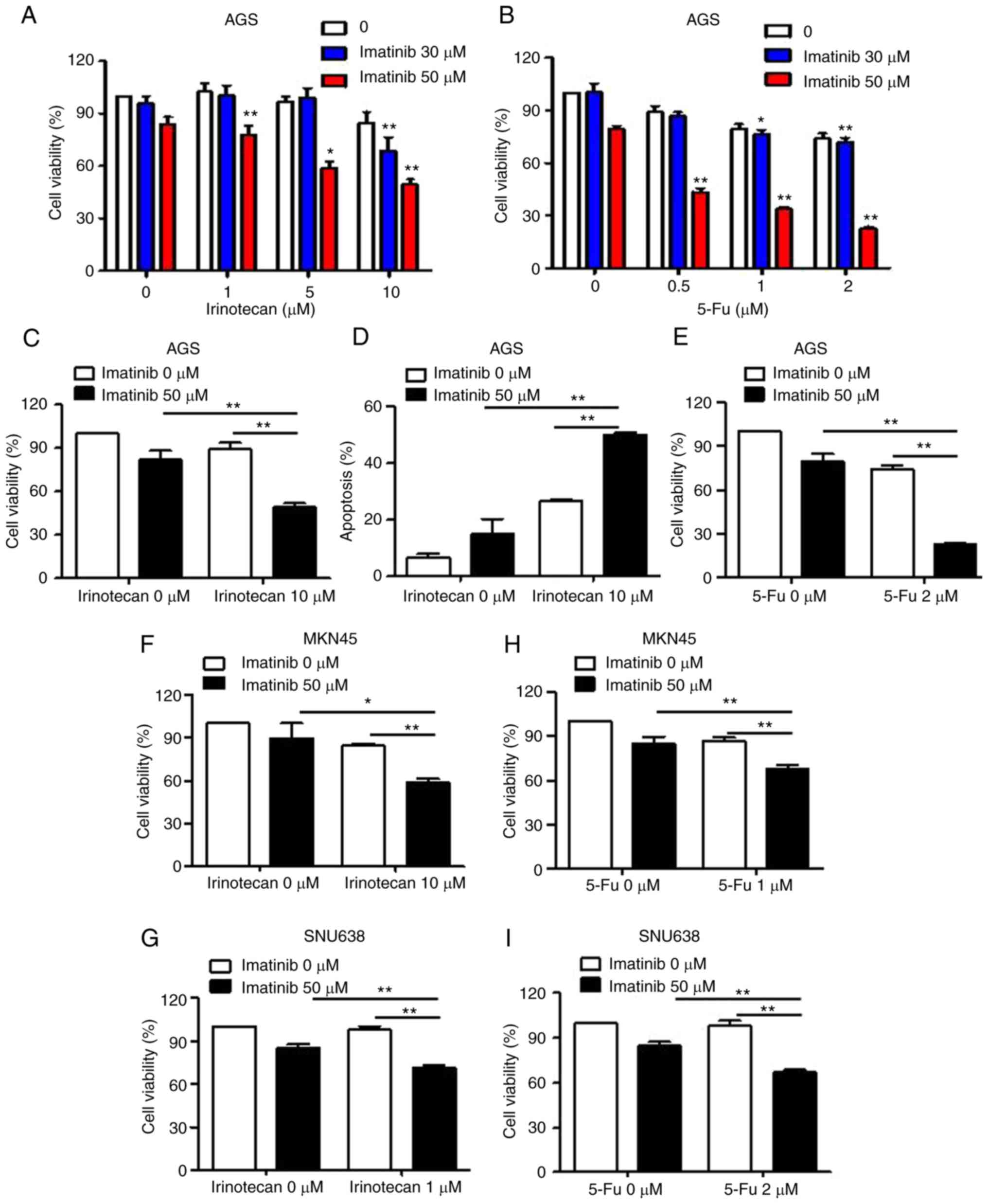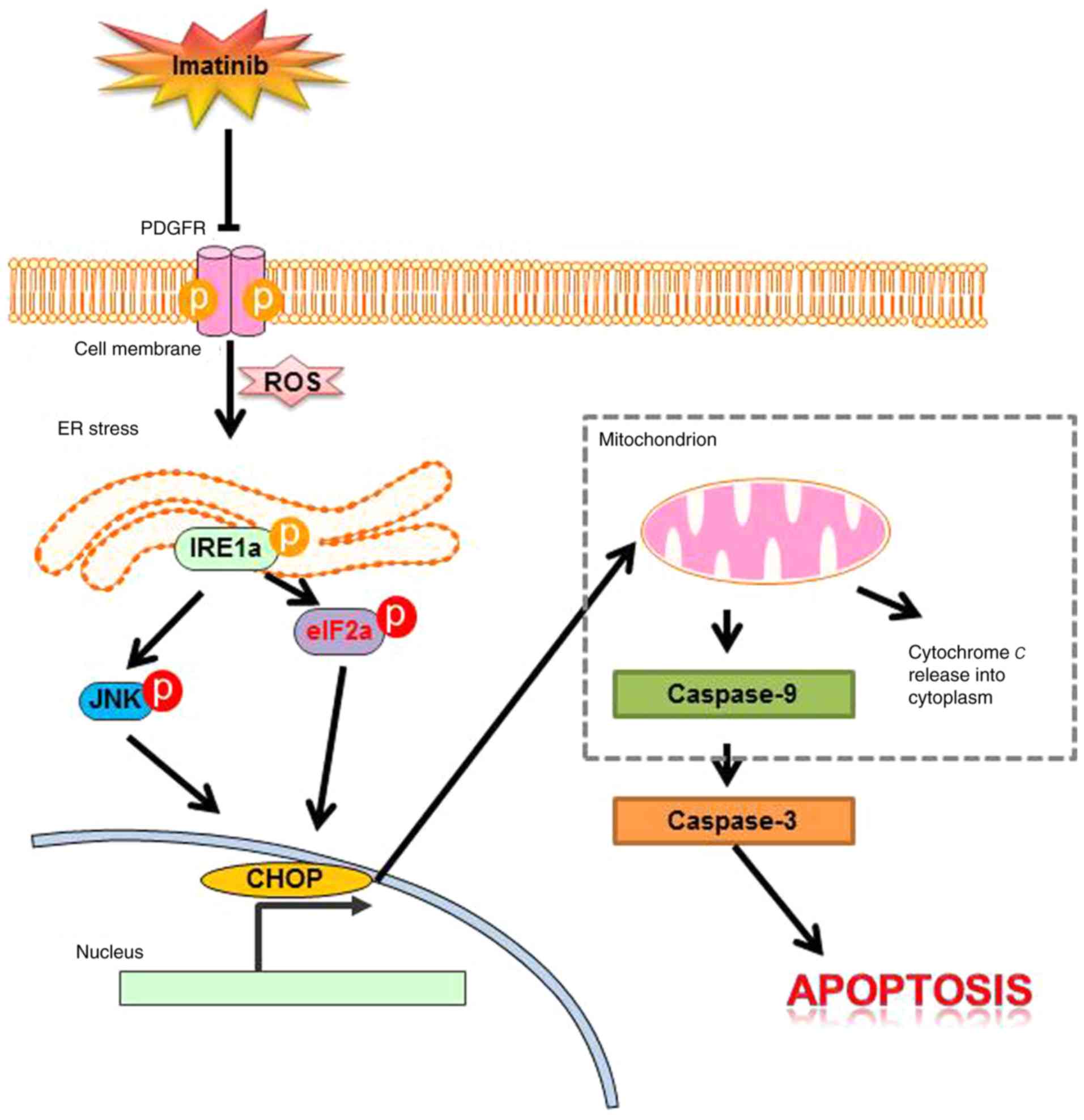|
1
|
Jemal A, Bray F, Center MM, Ferlay J, Ward
E and Forman D: Global cancer statistics. CA Cancer J Clin.
61:69–90. 2011. View Article : Google Scholar : PubMed/NCBI
|
|
2
|
Nakatani H, Araki K, Jin T, Kobayashi M,
Sugimoto T, Akimori T, Namikawa T, Okamoto K, Nakano T, Okabayashi
T, et al: STI571 (Glivec) induces cell death in the
gastrointestinal stromal tumor cell line, GIST-T1, via endoplasmic
reticulum stress response. Int J Mol Med. 17:893–897.
2006.PubMed/NCBI
|
|
3
|
Kadivar A, Kamalidehghan B, Akbari Javar
H, Karimi B, Sedghi R and Noordin MI: Antiproliferation effect of
imatinib mesylate on MCF7, T-47D tumorigenic and MCF 10A
nontumorigenic breast cell lines via PDGFR-β, PDGF-BB, c-Kit and
SCF genes. Drug Des Dev Ther. 11:469–481. 2017. View Article : Google Scholar
|
|
4
|
Donovan J, Abraham D and Norman J:
Platelet-derived growth factor signaling in mesenchymal cells.
Front Biosci. 18:106–119. 2013. View
Article : Google Scholar
|
|
5
|
Cumpănas AA, Cimpean AM, Ferician O,
Ceausu RA, Sarb S, Barbos V, Dema A and Raica M: The involvement of
PDGF-B/PDGFRβ axis in the resistance to antiangiogenic and
antivascular therapy in renal cancer. Anticancer Res. 36:2291–2295.
2016.PubMed/NCBI
|
|
6
|
Kazlauskas A: PDGFs and their receptors.
Gene. 614:1–7. 2017. View Article : Google Scholar : PubMed/NCBI
|
|
7
|
Pietras K, Sjöblom T, Rubin K, Heldin CH
and Ostman A: PDGF receptors as cancer drug targets. Cancer Cell.
3:439–443. 2003. View Article : Google Scholar : PubMed/NCBI
|
|
8
|
Minamino T, Komuro I and Kitakaze M:
Endoplasmic reticulum stress as a therapeutic target in
cardiovascular disease. Circ Res. 107:1071–1082. 2010. View Article : Google Scholar : PubMed/NCBI
|
|
9
|
Tsai YC and Weissman AM: The unfolded
protein response, degradation from endoplasmic reticulum and
cancer. Genes Cancer. 1:764–778. 2010. View Article : Google Scholar : PubMed/NCBI
|
|
10
|
Malhotra JD, Miao H, Zhang K, Wolfson A,
Pennathur S, Pipe SW and Kaufman RJ: Antioxidants reduce
endoplasmic reticulum stress and improve protein secretion. Proc
Natl Acad Sci USA. 105:18525–18530. 2008. View Article : Google Scholar : PubMed/NCBI
|
|
11
|
Thuerauf DJ, Marcinko M, Gude N, Rubio M,
Sussman MA and Glembotski CC: Activation of the unfolded protein
response in infarcted mouse heart and hypoxic cultured cardiac
myocytes. Circ Res. 99:275–282. 2006. View Article : Google Scholar : PubMed/NCBI
|
|
12
|
Xu C, Bailly-Maitre B and Reed JC:
Endoplasmic reticulum stress: Cell life and death decisions. J Clin
Invest. 115:2656–2664. 2005. View
Article : Google Scholar : PubMed/NCBI
|
|
13
|
Mansfield KD, Simon MC and Keith B:
Hypoxic reduction in cellular glutathione levels requires
mitochondrial reactive oxygen species. J Appl Physiol.
97:1358–1366. 2004. View Article : Google Scholar : PubMed/NCBI
|
|
14
|
Waypa GB, Guzy R, Mungai PT, Mack MM,
Marks JD, Roe MW and Schumacker PT: Increases in mitochondrial
reactive oxygen species trigger hypoxia-induced calcium responses
in pulmonary artery smooth muscle cells. Circ Res. 99:970–978.
2006. View Article : Google Scholar : PubMed/NCBI
|
|
15
|
Ostadal P, Elmoselhi AB, Zdobnicka I,
Lukas A, Elimban V and Dhalla NS: Role of oxidative stress in
ischemia-reperfusion-induced changes in
Na+,K+-ATPase isoform expression in rat
heart. Antioxid Redox Signal. 6:914–923. 2004. View Article : Google Scholar : PubMed/NCBI
|
|
16
|
Nojiri H, Shimizu T, Funakoshi M,
Yamaguchi O, Zhou H, Kawakami S, Ohta Y, Sami M, Tachibana T,
Ishikawa H, et al: Oxidative stress causes heart failure with
impaired mitochondrial respiration. J Biol Chem. 281:33789–33801.
2006. View Article : Google Scholar : PubMed/NCBI
|
|
17
|
Morgan WA: DNA single-strand breakage in
mammalian cells induced by redox cycling quinones in the absence of
oxidative stress. J Biochem Toxicol. 10:227–232. 1995. View Article : Google Scholar : PubMed/NCBI
|
|
18
|
Devasagayam TP, Tilak JC, Boloor KK, Sane
KS, Ghaskadbi SS and Lele RD: Free radicals and antioxidants in
human health: Current status and future prospects. J Assoc
Physicians India. 52:794–804. 2004.PubMed/NCBI
|
|
19
|
Gong K, Xie J, Yi H and Li W: CS055
(Chidamide/HBI-8000), a novel histone deacetylase inhibitor,
induces G1 arrest, ROS-dependent apoptosis and
differentiation in human leukaemia cells. Biochem J. 443:735–746.
2012. View Article : Google Scholar : PubMed/NCBI
|
|
20
|
Chang YJ, Huang YP, Li ZL and Chen CH:
GRP78 knockdown enhances apoptosis via the down-regulation of
oxidative stress and Akt pathway after epirubicin treatment in
colon cancer DLD-1 cells. PLoS One. 7:e351232012. View Article : Google Scholar : PubMed/NCBI
|
|
21
|
Atari-Hajipirloo S, Nikanfar S, Heydari A
and Kheradmand F: Imatinib and its combination with
2,5-dimethyl-celecoxibinduces apoptosis of human HT-29 colorectal
cancer cells. Res Pharm Sci. 12:67–73. 2017. View Article : Google Scholar : PubMed/NCBI
|
|
22
|
Akram AM, Iqbal Z, Akhtar T, Khalid AM,
Sabar MF, Qazi MH, Aziz Z, Sajid N, Aleem A, Rasool M, et al:
Presence of novel compound BCR-ABL mutations in late chronic and
advanced phase imatinib sensitive CML patients indicates their
possible role in CML progression. Cancer Biol Ther. 18:214–221.
2017. View Article : Google Scholar : PubMed/NCBI
|
|
23
|
Mahon FX: Discontinuation of TKI therapy
and ‘functional’ cure for CML. Best Prac Res Clin Haematol.
29:308–313. 2016. View Article : Google Scholar
|
|
24
|
Abu-Amna M, Awadie H and Bar-Sela G:
Imatinib-induced gastrointestinal vascular ectasia in a patient
with advanced gIST: Case report and literature review. Anticancer
Res. 36:6151–6154. 2016. View Article : Google Scholar : PubMed/NCBI
|
|
25
|
Sui X, Kong N, Ye L, Han W, Zhou J, Zhang
Q, He C and Pan H: p38 and JNK MAPK pathways control the balance of
apoptosis and autophagy in response to chemotherapeutic agents.
Cancer Lett. 344:174–179. 2014. View Article : Google Scholar : PubMed/NCBI
|
|
26
|
Balachandran VP, Cavnar MJ, Zeng S,
Bamboat ZM, Ocuin LM, Obaid H, Sorenson EC, Popow R, Ariyan C,
Rossi F, et al: Imatinib potentiates antitumor T cell responses in
gastrointestinal stromal tumor through the inhibition of Ido. Nat
Med. 17:1094–1100. 2011. View
Article : Google Scholar : PubMed/NCBI
|
|
27
|
Nakatani H, Kobayashi M, Jin T, Taguchi T,
Sugimoto T, Nakano T, Hamada S and Araki K: STI571 (Glivec)
inhibits the interaction between c-KIT and heat shock protein 90 of
the gastrointestinal stromal tumor cell line, GIST-T1. Cancer Sci.
96:116–119. 2005. View Article : Google Scholar : PubMed/NCBI
|
|
28
|
Matei D, Emerson RE, Lai YC, Baldridge LA,
Rao J, Yiannoutsos C and Donner DD: Autocrine activation of
PDGFRalpha promotes the progression of ovarian cancer. Oncogene.
25:2060–2069. 2006. View Article : Google Scholar : PubMed/NCBI
|
|
29
|
Li J, Kleeff J, Guo J, Fischer L, Giese N,
Büchler MW and Friess H: Effects of STI571 (gleevec) on pancreatic
cancer cell growth. Mol Cancer. 2:322003. View Article : Google Scholar : PubMed/NCBI
|
|
30
|
Mireskandari M, Shafaii AF, Kayser G and
Kayser K: Lack of CD117 and rare bcl-2 expression in stomach cancer
by immunohistochemistry. An immunohistochemical study with review
of the literature. Diagn Pathol. 1:72006. View Article : Google Scholar : PubMed/NCBI
|
|
31
|
Shandiz SA, Farasati S, Saeedi B,
Baghbani-Arani F, Asl EA, Keshavarz-Pakseresht B, Rahimi A, Assadi
A, Noorbazargan H, RahimpourHesari M, et al: Up regulation of KAI1
gene expression and apoptosis effect of imatinib mesylate in
gastric adenocarcinoma (AGS) cell line. Asian Pac J Trop Dis.
6:120–125. 2016. View Article : Google Scholar
|
|
32
|
Biswas SK, Zhao Y and Sandirasegarane L:
Imatinib induces apoptosis by inhibiting PDGF-but not
insulin-induced PI 3-kinase/Akt survival signaling in RGC-5 retinal
ganglion cells. Mol Vis. 15:1599–1610. 2009.PubMed/NCBI
|
|
33
|
Abouantoun TJ and MacDonald TJ: Imatinib
blocks migration and invasion of medulloblastoma cells by
concurrently inhibiting activation of platelet-derived growth
factor receptor and transactivation of epidermal growth factor
receptor. Mol Cancer Ther. 8:1137–1147. 2009. View Article : Google Scholar : PubMed/NCBI
|
|
34
|
Chang SP, Shen SC, Lee WR, Yang LL and
Chen YC: Imatinib mesylate induction of ROS-dependent apoptosis in
melanoma B16F0 cells. J Dermatol Sci. 62:183–191. 2011. View Article : Google Scholar : PubMed/NCBI
|
|
35
|
Yu C, Krystal G, Varticovksi L, McKinstry
R, Rahmani M, Dent P and Grant S: Pharmacologic mitogen-activated
protein/extracellular signal-regulated kinase
kinase/mitogen-activated protein kinase inhibitors interact
synergistically with STI571 to induce apoptosis in
Bcr/Abl-expressing human leukemia cells. Cancer Res. 62:188–199.
2002.PubMed/NCBI
|
|
36
|
Lenna S, Han R and Trojanowska M:
Endoplasmic reticulum stress and endothelial dysfunction. IUBMB
Life. 66:530–537. 2014. View Article : Google Scholar : PubMed/NCBI
|
|
37
|
Kim JL, Lee DH, Na YJ, Kim BR, Jeong YA,
Lee SI, Kang S, Joung SY, Lee SY, Oh SC and Min BW: Iron
chelator-induced apoptosis via the ER stress pathway in gastric
cancer cells. Tumour Biol. 37:9709–9719. 2016. View Article : Google Scholar : PubMed/NCBI
|
|
38
|
Han MS, Chung KW, Cheon HG, Rhee SD, Yoon
CH, Lee MK, Kim KW and Lee MS: Imatinib mesylate reduces
endoplasmic reticulum stress and induces remission of diabetes in
db/db mice. Diabetes. 58:329–336. 2009. View Article : Google Scholar : PubMed/NCBI
|
|
39
|
Pattacini L, Mancini M, Mazzacurati L,
Brusa G, Benvenuti M, Martinelli G, Baccarani M and Santucci MA:
Endoplasmic reticulum stress initiates apoptotic death induced by
STI571 inhibition of p210 bcr-abl tyrosine kinase. Leuk Res.
28:191–202. 2004. View Article : Google Scholar : PubMed/NCBI
|
|
40
|
Zhang X, Inukai T, Akahane K, Hirose K,
Kuroda I, Honna H, Goi K, Kagami K, Tauchi T, Yagita H, et al:
Endoplasmic reticulum stress inducers, but not imatinib, sensitize
Philadelphia chromosome-positive leukemia cells to TRAIL-mediated
apoptosis. Leuk Res. 35:940–949. 2011. View Article : Google Scholar : PubMed/NCBI
|
|
41
|
Lopez A, Harada K, Mizrak Kaya D and Ajani
JA: Current therapeutic landscape for advanced gastroesophageal
cancers. Ann Transl Med. 6:78–96. 2018. View Article : Google Scholar : PubMed/NCBI
|
|
42
|
Mayr M, Becker K, Schulte N, Belle S,
Hofheinz R, Krause A, Schmid RM, Röcken C and Ebert MP: phase I
study of imatinib, cisplatin and 5-fluoruracil or capecitabine in
advanced esophageal and gastric adenocarcinoma. BMC Cancer.
12:587–593. 2012. View Article : Google Scholar : PubMed/NCBI
|















